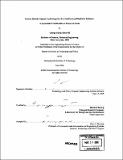Carbon dioxide capture technology for the coal-powered electricity industry : a systematic prioritization of research needs
Author(s)
Esber, George Salem, III
DownloadFull printable version (5.918Mb)
Other Contributors
Massachusetts Institute of Technology. Technology and Policy Program.
Advisor
Howard Herzog.
Terms of use
Metadata
Show full item recordAbstract
Coal is widely relied upon as a fuel for electric power generation, and pressure is increasing to limit emissions of the CO2 produced during its combustion because of concerns over climate change. In order to continue the use of coal without emitting CO2, low cost technologies must be developed for capturing CO2 from power plants. Current CO2 capture technology is expensive, both in terms of capital and operating cost, so research and development efforts will be heavily relied upon to improve the economic profile of the technologies. With scarce resources available for R&D, and a number or different technologies competing for these funds, efforts must be prudently prioritized in order for successful advancements to be realized. This thesis assesses the state-of-the-art CO2 capture technologies available today, as well as the leading technology options for improvement. It also examines types of R&D, government and industry roles in R&D efforts, and methods and tools for managing these efforts. From these analyses, qualitative conclusions about how to prioritize CO2 capture technology R&D efforts to ensure advancement are offered. (cont.) There are three technological pathways for CO2 capture - post-combustion, oxy-fired, and pre-combustion capture - and several technology options for improvement in each pathway. There are currently no clear winners, and there is much uncertainty in which technologies have the most potential to reduce the cost of capture. Government and industry interests should both be involved in advancing R&D, but should play different roles depending on the type of research and the maturity of the technology. Portfolios of potential technologies in various stages of development should maintained by both government and industry researchers and developers, and they should use a variety of portfolio management tools to aid in decision-making. This approach will ensure that the best technologies are advanced and CO2 capture technologies will be capable of helping meet future challenges.
Description
Thesis (S.M.)--Massachusetts Institute of Technology, Engineering Systems Division, Technology and Policy Program, 2006. Includes bibliographical references (p. 97-103).
Date issued
2006Department
Massachusetts Institute of Technology. Engineering Systems Division; Technology and Policy ProgramPublisher
Massachusetts Institute of Technology
Keywords
Technology and Policy Program.